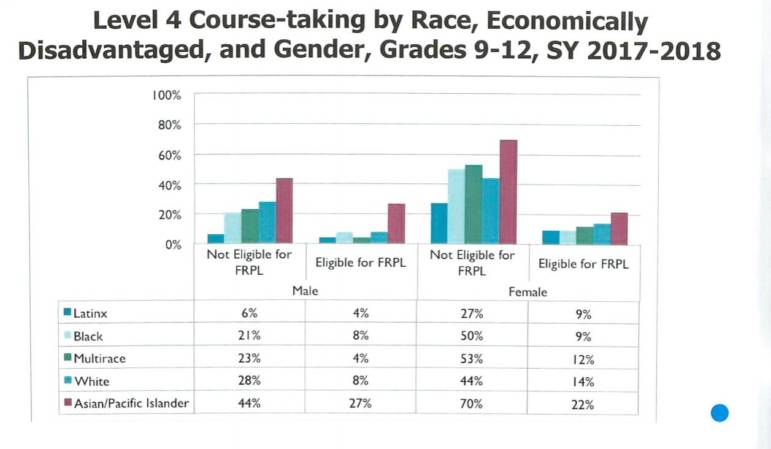
MANCHESTER, N.H. – Can the Manchester School District help struggling students achieve the success that some of their peers might take for granted? That topic was at the core of a study, with the early results from that study provided to the Board of School Committee on Monday night.
The study, run by a group of educators, students and community members called the Equity Review Team (ERT), was made possible by grant funding from the Nellie Mae Education Foundation with support from the Center for Collaborative Education and Plymouth State University.
Monday’s presentation from the study’s preliminary findings aimed to show early findings obtained from listening to students, parents and educators in Manchester on what the root causes are when it comes to educational inequality.
Since the study was launched in the summer of 2018, 524 people students, school staff members and community stakeholders participated in directed forums to provide their observations on addressing inequal student outcomes, as well as offering their viewpoints on solutions.
Ten languages in addition to English were used with some of the 524 participants, as one of the study’s findings showed that students without a native knowledge of English were being underserved in Manchester’s schools compared to their native English-speaking peers.
Students in ethnic minorities, disabled students and students coming from difficult socio-economic backgrounds were also considered to be underserved by the study which provided short term solutions ranging around six sub-themes.
Throughout those themes, the issue of improving communication appeared, especially among students and staff coming from different cultures. However, other recommendations also came from the subthemes, such as a re-examination of disciplinary polices and how they may adversely impact the underserved students more than other students.
Board of School Committee at-large member Richard Girard asked a series of questions, particularly in regards to efforts to acculturate immigrant students new to the culture within Manchester’s schools.
Spokespeople for the ERT told Girard that pedagogically, the issue of improved communication around culture was a two-way street, with all parties hopefully engaging more with the cultures of others they interact with, in the hope of eliminating subconscious bias.
Board of School Committee Ward 7 member Ross Terrio shared personal experience with minority family members that participated in Manchester’s schools and did not face the inherent bias addressed as a concern by the study.
He also questioned the feasibility of the study’s recommended restorative justice pilot program aimed toward conflict resolution, although it was voiced as a significant needed reform by each of the study’s participants.
Terrio cited claims that it led to lower teacher morale in other school districts that have used the concept as he said it was seen as a “get out of jail free card” for students with disciplinary problems looking to manipulate the system.
Board of School Committee Ward 1 member Sarah Ambrogi and Ward 3 member Mary Ngwanda-Georges voiced frustration with potential misconceptions over the study, particularly given the fact that it is still in its preliminary stages.
Georges and Board of School Committee Ward 5 member Lisa Freeman shared the story of a 10-year-old immigrant boy discouraged on being unable to catch up with his peers in reading.
“Rather than question whether people have experienced things let’s listen to the fact that for the people who participated in these forums, this was their lived experience,” said Ambrogi.
Girard responded to anyone believing he was opposed to the study by stating he sought to learn more about it by asking questions. He later also questioned if there were other factors relating to inequity, such as first-hand experience he shared during his time as a student at Manchester West High School several decades ago. There, he argued that discrimination against Manchester students compared to Bedford students enrolled in the school in advanced placement classes were comparable to the concerns posed in the study discouraging underserved students from pursuing advanced placement classes. Girard said that as one of the Manchester students, the discouragement he faced only stiffened his resolve, noting that there may be other underserved students like him in Manchester’s schools today and the ultimate goal should be treating each student individually.
All members of the board, as well as the presenters, agreed on the premise that all Manchester students deserve a quality education and that achievement gaps between Manchester students are an issue that must be addressed, even if there were differences of opinion on how to address that problem.
Board of School Committee Ward 8 member Jimmy Lehoux believed the problem was just a symptom of a larger structural issue with Manchester’s schools overall.
“I think a lot of these issues regarding opportunity are based on zip code and where these kids get to go (to school),” said Lehoux. “I think it’s a broader conversation we need to have on exactly how we educate our kids and create choices to give what excites them.”
Mayor Joyce Craig thanked the ERT members for presenting their early findings, with the presenters indicating that they would return in the near future with additional information.
CORRECTION: A statement regarding the 10-year-old boy was made at the 98th minute of the meeting, but the statement did not indicate that the boy left school.







